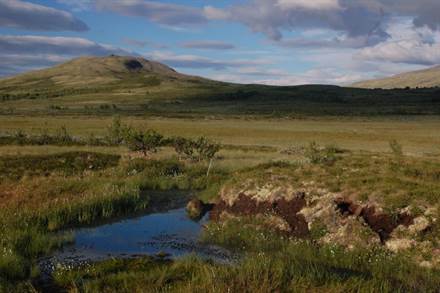
New PNAS article: Wise use of peatsoils essential for tackling climate change
-
Climate mitigation and adaptation
An international group of scientists from Vrije Universiteit and Wageningen University has calculated and modeled the potential effects of the exploitation of peatsoils on the greenhouse gas balance for Northern peatlands. In the new scientific publication in PNAS ‘The uncertain climate footprint of wetlands under human pressure’, they conclude that rewetting of drained peatsoils not only rapidly reduces emissions from drained peatlands but also on the longer term turns them into effective net greenhouse gas sinks. The wise use of peatsoils is essential in combating climate change.

Peatsoils store more than 500 gigatonnes of carbon in the Northern Hemisphere. Drainage and cultivation of these peatsoils results in the release of large amounts of CO2 to the atmosphere, altering the greenhouse gas balance and speeding up the warming of the earth.
The fact that drained peatlands are large emitters of greenhouse gases has been known for a long time. Rewetting reduces these emissions, but there has been uncertainty to what extent the reduced emissions of CO2 after rewetting would be off-set by increased emissions of methane, a strong greenhouse gas formed under wet conditions. This uncertainty has resulted in a lack of action to date. The recently published research confirms that after rewetting the uptake of CO2 more than compensates the negative effect of methane.
Dr. Arina Schrier, one of the researchers and currently Associate Expert at the international organisation Wetlands International, concludes: “The research is of importance, because the conclusions highlight the need for worldwide and Europe wide action for restoration of peatlands to immediately reduce the high greenhouse gas emissions from drained peat”.
The modelling was based on large datasets of direct greenhouse gas measurements in many countries in Europe. Elmar Veenendaal from Wageningen University: “The shift from ‘wet’ peatsoils to ‘drained’ peatsoils is the worst scenario you can think of in the context of climate effects”.
The results of the study, published 24 March in PNAS scientific journal, will help improving the IPCC climate scenario’s. Ko van Huissteden, Vrije Universiteit, says: “Our research shows that a high responsibility is in the hands of peatland owners and politicians to use these peatlands wisely, and manage them in such a way that release of CO2 and thus loss of peatsoil is avoided”.
Read the article at: ‘The uncertain climate footprint of wetlands under human pressure’.
Authors: Vrije Universiteit (Ko van Huissteden, Han Dolman), Wageningen Universiteit (Elmar Veenedaal, Arina Schrier – Arina is currently working of Wetlands International)
For more information, please contact
Arina Schrier: [email protected]
Elmar Veenendaal, [email protected] and 0317 483815
Ko van Huissteden: [email protected]
According to Wetlands International peat-rich countries should treat peatlands as priority areas to reduce emissions in the land sector. Wetlands International calls for strong incentives for peatland conservation and restoration in the new climate agreement which is scheduled to be adopted in 2015.
